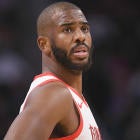Chris Paul was considered untradeable when the offseason began. With three years remaining on a max contract that now looks questionable given his age and declining production, it was widely assumed that he would live out the rest of his deal on a Houston Rockets team facing similar concerns with the rest of its roster. Instead, he was dealt to the Oklahoma City Thunder in exchange for Russell Westbrook, and rumors immediately swirled concerning a second trade to the Miami Heat.
The win-now Heat have much more to gain by employing Paul than the rebuilding Thunder, but the two sides were unable to strike an agreement in the immediate aftermath of his trade to Oklahoma City. With no other obvious suitors, Paul was expected to play out the remainder of his deal as a member of the Thunder, but according to Shams Charania of The Athletic, the Heat are still interested in potentially acquiring Paul. According to Charania, "Miami will likely elect to see how it starts the season before gauging a new pursuit of Paul."
The biggest obstacle in a Paul trade is matching salary. He is due over $38.5 million this season, and at his salary level, an acquiring team would need to send out at least 80 percent of that figure to legally absorb him.
Here is where things get even trickier: the Heat are hard-capped by the Jimmy Butler sign-and-trade. They cannot exceed $138,928,000 in salaries for any reason, meaning they would have to send out more salary than most teams in order to acquire Paul.
But the Thunder don't want to take on extra salary. They have worked all offseason to avoid the luxury tax, finally ducking under it after buying out Patrick Patterson, but exceeding it again in order to sign Justin Patton. The Thunder have paid the tax in three of the past four seasons, making them a repeater tax team. Those extra dollars are critical in a market like Oklahoma City. Their goal in trading Paul would likely be to avoid paying the tax entirely.
In making a deal, the Heat and Thunder would need to very carefully thread that needle. The Thunder need to shed money overall, but the Heat can only absorb so much.
Miami has an abundance of large cap figures. Some of them are desirable, like the expiring deal of Goran Dragic or the relatively cheap extension for Justise Winslow. Others, like the hefty contracts given to James Johnson, Kelly Olynyk and Dion Waiters, are less valuable to Oklahoma City. The Thunder may only accept such contracts with additional compensation, which the Heat would struggle to currently offer. The Stepien Rule prevents them from trading another first-round pick until 2025.
Neither side has given an inch in negotiations so far, but once the season starts and both organizations have seen how their rosters look in action, that might change. A deal is still very possible, it just isn't likely to come for at least a little while longer.


















